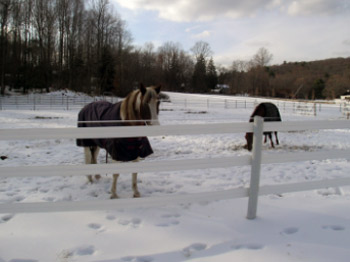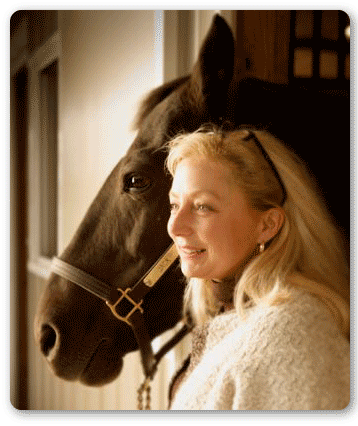Winterize Your Fence

Winter is just around the corner. Take advantage of the warmer days that we have left and repair your fence before the really cold temperatures hit. Check your fence rails by walking the fence line. Or, have a really good excuse to get out and ride and check them. When you are above your fence, you have the opportunity to see more than when you are walking. (You may also find that lost horseshoe.) Once you see what repairs need to be made, gather the necessary tools and fence parts. It can be quite frustrating to get out to your pasture only to find out you forgot the one tool that you need.
Some helpful tools and hardware are as follows:
- Hammer
- Utility knife
- Fence pliers
- Ratchet handles (for spoolers)
- Tensioner handle (for tensioners)
- Barbed fence staples
- 5 inch and 3.5 inch ring shank nails
- Short pieces of fencing (for Flex-Fence, or electric)
- Check to be sure you have replacement rails and posts for wood or PVC fences
You may also want to make or take some small flags for areas that you cannot repair immediately.
When you return to make the repairs, you will be able to find that spot quickly. Any rails that need to be replaced or adjusted should be done now. Waiting only makes repair harder in adverse weather. Additionally, you want your fence to be as safe as it can be to avoid any problems or injury to your horses. Straighten any posts that are leaning. Tamp around posts with dirt or screenings to be sure they stay secure.
If you have trees in your pasture that horses have not touched, they may start to chew the bark in winter.
This could be dangerous to your horse and definitely will kill a tree that may provide shade in the hot months. If you cannot fence around your trees, try this tip in a pinch. Purchase chicken wire or woven wire that is easy to bend. Using barbed fence staples, tack the wire around the base of the tree, down around the roots, and as high up as your horse can reach. Most horses will not try to chew with the wire in place. In most cases you don't even see the wire on the tree. Check yearly and make sure the wire stays snug but not so tight that it grows into the bark of the tree. Additional wire may be added if needed.
Look at your gates.
Gate maintenance is a must because ground does move from frost to thaw, from heat, as well as from use. If your gate is leaning, the gatepost may be leaning too. If it is, straighten the post, and re-brace it. Heavy and sagging gates can benefit from the use of a gate wheel or a sure latch. They will support the weight of the gate, helping to stop sagging of longer and heavier gates. If your brace post is not leaning, you may need to adjust the gate hangers to lengthen or shorten the distance between your gate and your latch post. Also check your gate latches. If they are not working well, get a new one. Even a simple one-handed gate latch will save you the worry of loose horses in winter.
Drive home any nails that are protruding anywhere, and replace any cracked posts.
If you did not have pressure treated posts, consider replacement posts that are CCA treated with a .40 (or better) retention level. Your posts will have a 40-year life expectancy (under the ground line, excluding abuse).
If your horses had the tendency to get "through" your rail spacing, consider a rail of simple and easy to install electric, or maybe a plastic coated wire or 1 inch rail.
They are easy to install and will make the rail spacing less inviting to horses when winter grass looses its color and protein content. Also, if needed, throw your horses extra hay. Grass hay in the winter allows your horses to still graze, as horses are grazing animals. This will also help to stop your horses from pawing for roots, which can cause sand colic. Eventually as winter moves closer, the grass on the other side of the fence starts to look better than the grass inside your pasture. Feeding some extra hay will stop your horse from eating grass on the other side of the line. This will not only stop the abuse to your fence, but also save you money from costly repairs and maintenance. Abuse can also be stopped with electric fencing.
Take some time to check fence lines and make necessary repairs before the winter winds stir and the snow flies.
Whether you're in your warm home or out in your horses' barn, you will be able to have the peace of mind knowing your equine friends are secure when they are out in their pasture. Have a safe and cozy winter.
 Debbie has over 45 years experience with horses and equine-related businesses. She has owned, trained, boarded horses and run stables at various times in her career. She is a certified fence installer, has given balanced riding lessons, and has shown horses in Western, Western Pleasure, Trail, English, Hunter/Jumper, Fox Hunting, Hunter Trials, Dressage and driving classes. Debbie has been involved in foaling, and just about every aspect of horse ownership possible, and she welcomes your questions and comments. If you are interested in using any articles by Debbie, please send her an email.
Debbie has over 45 years experience with horses and equine-related businesses. She has owned, trained, boarded horses and run stables at various times in her career. She is a certified fence installer, has given balanced riding lessons, and has shown horses in Western, Western Pleasure, Trail, English, Hunter/Jumper, Fox Hunting, Hunter Trials, Dressage and driving classes. Debbie has been involved in foaling, and just about every aspect of horse ownership possible, and she welcomes your questions and comments. If you are interested in using any articles by Debbie, please send her an email.
